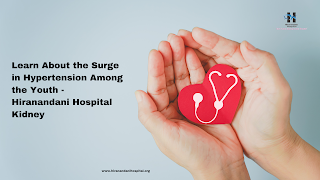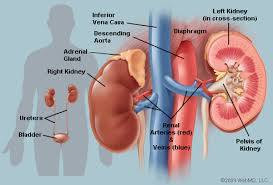Learn About the Surge in Hypertension Among the Youth - Hiranandani Hospital Kidney
In the contemporary world, the primary factors contributing to the upsurge of hypertension in young individuals are stress and unhealthy lifestyle choices. Genetic and hereditary elements also play a role in this condition, making it crucial for those with such risk factors to exercise caution. Young people may also exhibit certain reversible factors that need timely identification.
Dr. Aditya Verma of Golf View Healthcare & Research Institute emphasized the importance of early diagnosis, as hypertension is often a silent threat, capable of reaching a life-threatening stage without warning symptoms. He stressed the necessity for regular medical checkups, particularly for those with a family history of hypertension. These checkups can commence as early as the age of 20, and further plans can be tailored based on the findings and individual risk profiles.
To address stress and poor lifestyle habits, Dr. Verma recommended adhering to general guidelines such as quitting smoking, adopting an active lifestyle, making dietary adjustments, and engaging in daily exercise. Stress management can be achieved through practices like Pranayam and Yoga Nidra, ensuring restful sleep, and cultivating qualities of kindness, love, honesty, and acceptance in life.
Causes of Hypertension in Young Individuals: Hypertension, or high blood pressure, can have various underlying causes in young individuals. While it’s more commonly associated with older age, it can also affect younger individuals due to various factors. Dr. Sujit Chatterjee, CEO Hiranandani Hospital, Powai, outlined potential triggers for hypertension in young individuals:
- Genetic Predisposition: A family history of hypertension increases the risk of developing high blood pressure at a young age, especially if one or both parents have hypertension.
- Unhealthy Lifestyle Choices: Factors such as an unbalanced diet, lack of physical activity, smoking, excessive alcohol consumption, and high stress levels can contribute to hypertension by causing weight gain, elevated blood cholesterol levels, and increased blood pressure.
- Obesity: Being overweight or obese is a significant risk factor for hypertension, as it places additional strain on the heart and blood vessels, leading to elevated blood pressure.
- Kidney Problems: Certain kidney conditions, like chronic kidney disease or renal artery narrowing (renal artery stenosis), can contribute to hypertension in some cases.
- Hormonal Imbalances: Hormonal disorders, such as hyperthyroidism or abnormal adrenal gland function, can occasionally lead to hypertension.
- Medication Effects: Specific medications, like non-steroidal anti-inflammatory drugs (NSAIDs), oral contraceptives, and certain antidepressants, can raise blood pressure levels in some individuals.
Read More :- Comprehensive Kidney Care at Hiranandani Hospital: Your Path to Optimal Health
Tips for Managing Hypertension in Young Individuals: Dr. Kaushal Chhatrapati, MD DM, FACC FSCAI FESC, Interventional Cardiologist, offered the following recommendations for dealing with hypertension in young individuals:
- Always seek medical advice when high blood pressure is diagnosed in young individuals, as neglecting treatment can be extremely dangerous. Most cases of hypertension require medication.
- Ensure you get at least 8 hours of uninterrupted sleep each day, as a well-rested body and mind are essential for preventing various diseases, including high blood pressure.
- Engage in regular exercise, with just 35 minutes of moderate-intensity activity each day being sufficient to help control high blood pressure.
- Maintain a healthy diet by avoiding junk and processed foods, consuming five servings of fruits and vegetables daily, and limiting salt intake.
- Keep your body weight within the ideal range, as increased body mass index (BMI) is associated with higher blood pressure.
- Prioritize stress management through various strategies.
- Consider having a pet, preferably a dog, as studies have shown a lower incidence of cardiovascular diseases, including hypertension, in dog owners.
- Eliminate alcohol, tobacco, and illicit drugs, as even small amounts can disrupt sleep and stimulate the sympathetic nervous system, leading to high blood pressure.
Dr. Chhatrapati emphasized that hypertension is increasingly being diagnosed in younger individuals, and while many cases are preventable through lifestyle modifications, all cases are treatable.
Food Items to Include in the Diet to Prevent Hypertension in Young Individuals: Controlling high blood pressure (hypertension) is a key factor in preventing heart attacks. This can be achieved through dietary and lifestyle changes. Dietician Garima Goyal listed several foods that may help lower elevated blood pressure:
- Kiwi: Consuming two to three kiwis a day can aid in managing high blood pressure due to their high content of magnesium, potassium, fiber, and vitamin C, all of which have blood pressure-lowering properties.
- Cinnamon: Adding cinnamon to your diet can help dilate and relax blood vessels, making it an effective blood pressure-lowering spice.
- Bran Roti: Including whole grains like bran roti in your diet can reduce blood pressure, as the magnesium in bran helps lower systolic and diastolic pressure.
- Beetroot: Consuming beetroot, either raw, steamed, or in kebab form, is beneficial for blood pressure management due to its high nitric oxide content.
- Pistachios: These nuts can help manage blood pressure levels, with many studies showing positive effects on blood lipids and cholesterol when they replace some calories in the diet.
- Hibiscus Flower Tea: Hibiscus tea can lower blood pressure, making it a suitable choice for those at risk of hypertension or with mildly elevated blood pressure.
It’s important to note that no single food can drastically reduce blood pressure, and it’s typically a combination of dietary changes and lifestyle modifications that yield the best results. Experts recommend following the DASH diet, which includes fruits, vegetables, and whole grains, for individuals with high blood pressure or those looking to maintain healthy level



Comments
Post a Comment